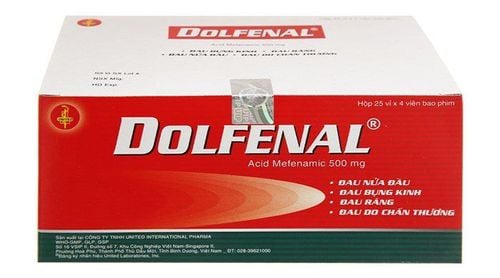This is an automatically translated article.
Defnac is used by intramuscular injection or intravenous infusion as directed by a doctor to effectively treat the symptoms of osteoarthritis, rheumatism, menstrual pain and headache,... When using Defnac, patients need to strictly follow their doctor's instructions to ensure safety and avoid the risk of experiencing adverse reactions.
1. What is Defnac?
Defnac belongs to the group of pain relievers and treatment for osteoarthritis, manufactured by M/s Searle Pakistan Limited - PA KIT XTAN. Defnac is prepared as a solution for injection, each box includes 5 ampoules of 3ml. The main active ingredient in Defnac is Diclofenac Sodium 75mg. In addition, the manufacturer also added other auxiliary excipients to increase the therapeutic effect of Defnac.
2. What are the uses of Defnac?
2.1 The effect of the active ingredient Diclofenac Sodium Diclofenac belongs to the group of non-steroidal anti-inflammatory drugs, with strong analgesic, antipyretic and anti-inflammatory effects. Therefore, the active ingredient Diclofenac is especially suitable for those who need to treat acute inflammation or pain.
According to research, Diclofenac has the ability to inhibit the biosynthesis of Prostaglandin - the substance involved in causing inflammation, fever and pain for patients. Diclofenac has also been shown to be an effective pain reliever for moderate to severe pain. When inflammation occurs in the body, such as inflammation due to surgical intervention or trauma, Diclofenac provides a rapid reduction in wound edema. Some clinical research results also show that Diclofenac has the ability to reduce pain as well as the degree of bleeding of primary dysmenorrhea. In addition, this active ingredient also helps to reduce headache pain and effectively improve the accompanying symptoms of nausea or vomiting.
Usually, Diclofenac is used for short-term treatment of acute painful inflammatory cases in certain specialties such as odonto-stomatology, otolaryngology, and obstetrics and gynecology. In addition, Diclofenac is also used to treat pain after surgery, trauma, menstrual pain, migraine, extra-articular rheumatism and spinal syndrome.
2.2 Indications and contraindications to using the drug Defnac Currently, the drug Defnac is prescribed by doctors to use for the following cases:
Long-term treatment of symptoms of rheumatoid arthritis, rheumatoid arthritis chronic, ankylosing spondylitis, Fiessiger-leroy-reiter syndrome, psoriatic rheumatism, painful stiffness and loss of ability to work. Short-term treatment of acute symptoms of rheumatism, tendinitis, forearm shoulder periarthritis, synovitis, bursitis, bursitis tendinitis, gout attacks, low back pain, arthritis microcrystalline, severe radiculopathy, renal colic, biliary colic, dysmenorrhea, minor surgery pain, pain from oral surgery, tonsillectomy or trauma. Supports the treatment of inflammatory conditions of the ear - nose - throat. Avoid self-administering Defnac to the following patients without a doctor's prescription:
Patients with a history of hypersensitivity or allergy to Diclofenac, Aspirin or other non-steroidal anti-inflammatory drugs. People with advanced peptic ulcer disease or gastric perforation. Defnac is contraindicated in patients with asthma, urticaria, acute rhinitis, bronchospasm, cardiovascular disease, bleeding, severe renal or hepatic impairment. Do not use Defnac for people with colloidal disease or who regularly wear contact lenses. Avoid taking Defnac to pregnant women or nursing mothers.
3. Instructions on dosage and usage of Defnac
Defnac is prepared as a solution for intramuscular injection or intravenous infusion based on specific instructions from your doctor. Patients can use the lowest dose of Defnac but still have the effect in the shortest time. However, avoid taking the drug for more than 2 days, if necessary, the drug can be continued in the form of suppositories or oral tablets. Below is the dose of Defnac as prescribed by the doctor:
Dosage for adults: Use 1 ampoule/day, inject deep intramuscularly into the buttocks (1/4 before the outside). For patients with severe inflammation or pain, 2 ampoules/day can be injected into one buttock and spaced a few hours apart. In certain cases, the physician may alternately administer 1 ampoule of Defnac with suppositories/tablets until the maximum dose of 150mg/day is reached. Migraine treatment: Initial dose of 75mg should be given as soon as possible, followed by 100mg suppository on the same day, however the total dose should not exceed 175mg on the first day of treatment. Avoid single injection of Defnac solution directly into the vein, instead it should be diluted before infusion. Treatment of moderate to severe postoperative pain: 75mg slow intravenous infusion continuously over 30 minutes to 2 hours. Repeat the therapeutic dose after a few hours, but do not exceed 150mg/24 hours. Prophylaxis of postoperative pain: 25-50mg infusion over 15 minutes to 1 hour. The infusion may be continued with another course of approximately 5 mg/hour until a maximum dose of 150 mg/day is reached.
4. Possible side effects when taking Defnac
During the treatment of painful inflammatory symptoms with Defnac, patients may accidentally encounter some of the following side effects:
Epigastric pain. Headache . Dizziness or dizziness. Nausea or vomiting. Diarrhea. Stomach ulcers . Gastrointestinal bleeding. Sleepy. Red rash. Pimples on the skin. Get angry. Liver and kidney damage. Disorders of blood-forming organs. If any of the side effects mentioned above occur, the patient should immediately inform the doctor so that corrective action can be taken soon. In case of symptoms of gastrointestinal bleeding or stomach ulcer, you need to stop taking Defnac immediately and go to a medical facility for a diagnosis.
5. Important notes when treating with Defnac
In order to ensure the safety and early effectiveness of Defnac treatment, patients should note the following:
Be careful when using Defnac for people with symptoms of digestive disorders, history of bleeding bleeding, ulceration or perforation of the gastrointestinal tract. Caution is advised before deciding to administer Defnac to patients with Crohn's disease, ulcerative colitis, hemostasis defects, or extracellular volume loss. Caution should be exercised when treating patients with Defnac with liver failure, heart failure, kidney failure, a history of high blood pressure or a disorder of porphyria. Defnac should be used with caution in patients taking diuretics, systemic corticosteroids, antiplatelet agents, anticoagulants, drugs that affect renal function, or selective serotonin reuptake inhibitors. The use of Defnac is not recommended in patients with severe lactase deficiency, galactose intolerance or glucose-galactose malabsorption. Do not arbitrarily use Defnac for the elderly, pregnant women or nursing mothers without consulting a doctor. Defnac can cause dizziness, lightheadedness and nausea, etc. Therefore, people who often drive or operate machinery should be careful when using the drug. Defnac is not suitable for children and adolescents. Defnac may interact with other systemic NSAIDs, Lithium, Digoxin, Corticosteroids, Quinolones, antihypertensives, diabetes medications, Ciclosporin, anticoagulants. or Methotrexate. Before starting treatment with Defnac, patients should inform their doctor about the list of drugs as well as their current medical condition to receive the most appropriate medication advice. In addition, you also need to carefully check the expiry date and quality of the drug Defnac before using. If the medication is out of date or the solution shows signs of discoloration or impurities, discard it as directed by your healthcare provider.
Defnac medicine should be stored in a dry place, the temperature is below 30 degrees Celsius and out of reach of small children. During the course of taking the drug, if any unusual reactions occur, you need to notify your doctor immediately to have a solution as soon as possible.
Above is all information about Defnac drug, patients need to carefully read the instructions for use, consult a doctor / pharmacist before using. Note, Defnac is a prescription drug, patients absolutely cannot buy and treat at home because they may experience unwanted side effects.













